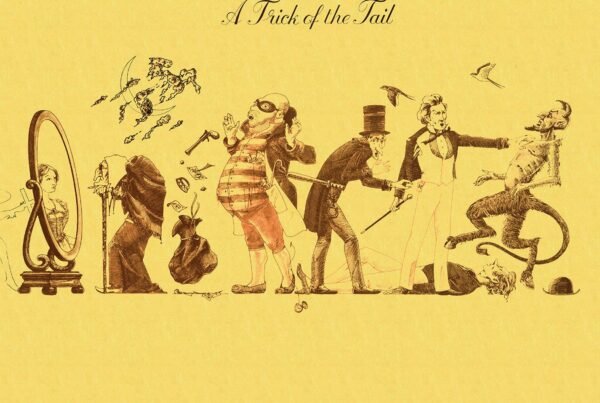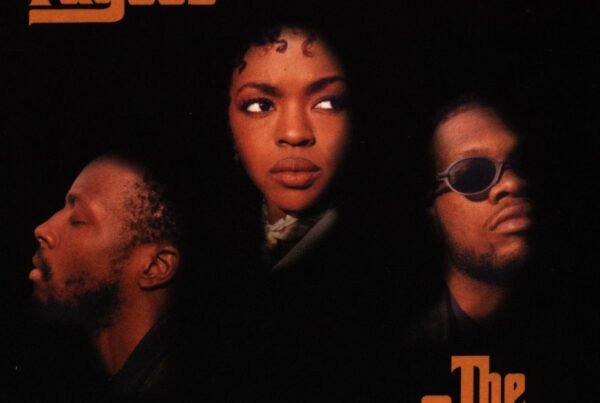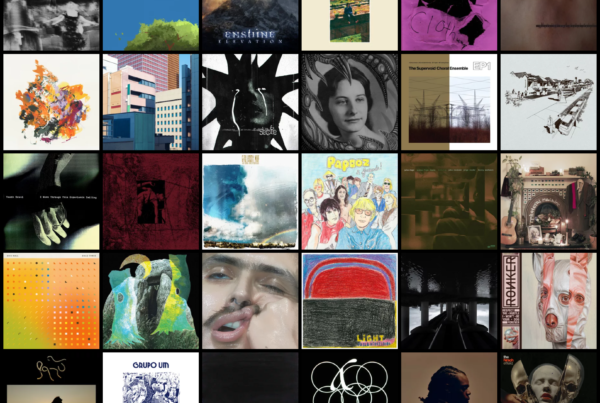‘This isn’t patronizing music: Isis made music for the thinker in all of us, in a way that wasn’t pretentious or condescending.‘

Release date: October 19, 2004 | Ipecac Recordings | Bandcamp | Facebook | Website | YouTube
Post-metal, much like post-rock, is very hit-or-miss; either it touches upon transcendence, or it devolves into meaninglessness instilled by uninspired songwriting. Panopticon by dearly departed genre trailblazers Isis is very much a textbook example of the former, bringing a progressive edge to the harsh and soundscape-driven sound the band previously cultivated. This is the gold standard of what post-metal can achieve.
Steve Loschi
Full disclosure: I’m firmly in the Oceanic camp when it comes to Isis, but that’s not to take away from the brilliance of Panopticon. It’s not particularly hyperbolic to insist that in the history of metal there are few one-two punches that have hit as hard as these two records from the 2000s. In my case, however, Oceanic is one of those rare albums of which I can recall the time and place I first heard it as if it happened yesterday and not, well, over TWENTY YEARS AGO. I was in the driver’s seat of a Mitsubishi Gallant (which I would later total in a desperate sprint to pee in a Greenpoint Burger King – I opened the door and an 18-wheeler took it right on off) outside a record store. I had read about the album in the Time Out magazine I subscribed to, and it seemed to hit all the right notes. I called in sick to work to drive to Montreal from Brooklyn for a long weekend with my wife and neighbor, and I was waiting for them to get off the subway. From the opening notes I was just swept away in the ambient majesty of the atmosphere Aaron Turner and the rest of his crew were carefully crafting together, a mash-up of everything I loved about metal and – more importantly – what I thought I liked about metal, but couldn’t articulate.
I probably saw them a half dozen times live between, and during, the release of Oceanic and Panopticon, the latter seeming to be a natural extension of the foundation laid down on the previous album. Relentless touring to promote Oceanic turned Isis into one of the best bands of the post-metal era, and even that is probably down-playing the importance of the band. This incessant performing led to an album that seemed to smooth the rough edges of Oceanic to a shimmering, chiseled piece of precious metal. In a way, Isis was the only band at the time taking the angular attacks of Slint, and the meandering, self-loathing explorations of Neurosis away from the world of punk rock, and depositing it firmly within the cinder-block walls of heavy metal.
That being said, Panopticon may have even chiseled some glaring holes in those cinder block walls in a quest to expand the sometimes constraining parameters of that most stubborn of genres. There’s just as much introspection – lyrically as well as sonically – as you’d find on a mid-’70s Pink Floyd album, and the band was never afraid to punctuate their songs with lingering passages of psychedelic and electronic musical interludes. Both opener “So Did We” and “Backlit” were seven-plus minutes of angst-ridden post-metal, Aaron Turner’s death growls giving way to swirling guitars and a pulsating understructure of keys before the veins popped out of the neck and forehead once again, and the spit went flying.
“In Fiction” was a fixture of their live sets, a simmering primordial soup of sounds that seemed to swirl in psychedelic colors of suspense and sonic exaltations. Producer Matt Bayles probably doesn’t get enough credit for shaping the Isis sound, as the crisp, honest production gives the music an immediacy that can easily get lost in the compression and tools that really began showing up in 21st century metal. It’s not just that the music of Panopticon obviously works at a stadium level – in a perfect world, the thick, headbanging groove that hits about a minute into “In Fiction” would have a stadium of tens of thousands exploding in abject orgasmic glory. It’s that the music sounds as if the band is practicing in your living room in a New England cabin hidden in the woods, a fire roaring in the fire place as you sink into the couch with a glass of red wine in your hand. It’s highly emotive production, and gloriously organic.
And that’s probably what makes Panopticon so timeless. Even listening to it now, the music sounds remarkably fresh and cerebral. There’s an artistic commitment to making sure that each note matters, and that each note hits just the right fucking way. This isn’t patronizing music: Isis made music for the thinker in all of us, in a way that wasn’t pretentious or condescending. To rock this hard and still be able to tap into the cerebral connections that make the human brain the most amazing computational tool to ever spring from the evolutionary tree is a pretty staggering feat. And Panopticon, after twenty years, can still leave you weaving in your tracks, and thanking the metal gods the breadth of heavy music is big enough to include each and every one of us.
Broc Nelson
The mid 2000s were not really metal years for me. I loved a smattering of heavy metal when I was younger, but punk opened me up to, uh, softer sounds, I guess. Then the garage rock and indie wave that followed left me totally soft. As one friend would put it, I had been listening to nothing but ‘wuss tunes‘. I know, that if I had loyal readers, this little anecdote would feel like a tired refrain, the umpteenth ‘na na na naaa’ in “Hey Jude”. Yet, it was a pivotal moment for me as a music fan when I reacquainted myself with heavy metal, and Isis were a big part of that.
It was not Panopticon that did it, though. My first Isis love was Wavering Radiant. I still hold that album and Isis in the highest of regards, because they were my introduction to a world of more experimental heavy music. Now my music taste is widely encompassing, from wuss tunes to the gnarliest heavy metal and noise I can find, but I really don’t think I would have gotten this deep into it if it weren’t for Isis. So, an enormous amount of appreciation goes out to Aaron Turner and company for being a massive turning point for me.
Panopticon was the third Isis album I listened to. Wavering Radiant sold me. Oceanic connected deeper points of interest, but Panopticon is the Isis album I would point new listeners to. It hits a certain vibe that seems to balance everything the band had done up to that point. Revisiting Panopticon struck another chord for me; that this album is heavy metal’s answer to The Cure’s Disintegration, one of my all time favorite albums.
Yeah, these are very different genres, but while Panopticon lacks the lovely goth pop gleam that Disintegration is known for, it does have a similar approach to songwriting and atmosphere. “So Did We” bursts forward with harsh vocals, but the guitar tone and opening riff set a musical vibe that is carried throughout the album. The post-hardcore passage that follows calls to mind the more melodic and slower parts of Fugazi and is even reminiscent of Coheed & Cambria before the sludge metal influences weave their way in, progressing to post-rock crescendos akin to Godspeed You! Black Emperor and the quiet vs loud dynamics of The Pixies with a little spaced-out stoner/psych rock thrown in.
This hits more diverse and well loved artists for me than any algorithm could ever figure out. It is as kaleidoscopic as “Plainsong”, (track one on Disintegration), just in a different way. “Backlit”, similarly, offers a gripping and accessible melody in the way that “Pictures Of You” does, at once catchy, complex, and mournful. I cannot be convinced that the bass work from Jeff Caxide is not influenced by Simon Gallup, especially the way it complements the guitar melody by counter-acting the highs with its own deep tone. Coincidentally, one of the producers/engineers for Panopticon is also named Robert Smith, so, checkmate doubters.
This is all reinforced by “In Fiction”. Like, just listen to it bro, I swear. Like the syncopation, synths, and guitar plucks on “Syndic Calls” don’t at least give you a glimmer of “Lullabye” while the heavier parts carry the desperate intensity of “Fascination Street”?
Anyway, that is my main takeaway from diving into Panopticon after a few years of not listening to it. I do want to also emphasize my love for Aaron Harris’s drumming. The snare tone that drives Panopticon is punk as hell while Harris restrains his instinct to beat the kit into oblivion, giving each melodic and post-rock/post-hardcore inspired passage room to breathe, like a jazz drummer in the pocket while the rest of the ensemble builds tension.
It is no surprise that post-Isis, Aaron Turner would go on to form the heaviest improvised metal act of all time in Sumac. The man’s love for turning heavy metal into high art is truly a gift that we are all blessed to bear witness to, not to mention Old Man Gloom, his time as the headmaster at Hydra Head Records and their insane line-up over the years. Someone give Turner a lifetime achievement award for being one of the most inspiring forces in the heavy metal underground for the last 30 years. It may still be awkward to exclaim that you are a huge fan of Isis out loud, but extreme religious states don’t produce art this mesmerizing.
Eeli Helin
When talking about post-metal in general, Isis is usually embedded in that train of thought in a quite a significant fashion, and for a reason. The US-based, often avant-garde-oriented group is a prime example of being at the right place in the right time, and even though they’ve been buried for a long while now, they left a serious imprint to the global scene and people involved in it, either from a musician or an audience point of view. Thirteen active years, five full-lengths, and a plethora of EPs and other smaller releases later, Isis became synonymous with the concepts of delivering punch and care at the same time.
Panopticon is often treated as the album when it comes to Isis and their output, so obviously it was picked for this ASIR as well. I personally find it hard to pick a favourite out of the group’s doings thanks to each and every release having their own special angle and different emphasis on their craft, and each has an individual flair that makes them stand out from the rest depending on what you’re after whenever you put them on. What’s for certain, though, is that Panopticon just might be Isis’ heaviest album overall, therefore acting as a gateway for many leaning more into all kinds of metal-related shenanigans. It’s almost as if it’s a trap of sorts, since when you then go on to listen to the other albums, you can hear the signature Isis sound but in a vastly different context, and almost by accident open your perimeters for different, often softer, atmospheres and nuances. Either way, the album’s featured here for a reason of its own.
As per usual, I don’t recall Panopticon being the first I’d heard of the band, but it’s the first I remember actively listening to. Grating, mountain moving sonic pummeling intertwines with calm and near-soothing ambiances throughout the album’s almost an hour long duration, which provides an unbelievable amount of surface to adhere to while being some of the most immersive and holistic listening experiences on this side of the experimental aural scope.
It’d be pointless to pick apart the building blocks of something of this magnitude, so I’ll refrain from doing so. The experience Panopticon provides, not too dissimilarly to the concept where it derives its title from, is simply on another level. You are being led upon certain thresholds while simultaneously being the observer and the observed, and the line between the two gets all the more blurred the deeper you delve its musical halls and corridors. Even though I’d still personally pick some other album as my favourite from Isis’ oeuvre, I can fully comprehend how and why Panopticon is exactly that for a wide portion of their ever-growing audience. I have a profound sense of love and attachment to Isis due to how important the moment when they entered my life was, and if this feature pushes even one pair of ears to their lap, I’d consider that alone a victory.
Toni Meese
How would the post-metal landscape look today without Oceanic and its successor Panopticon? Hard to say, but most people will agree that Isis were absolutely integral to the development and progression of post-metal as a genre. With Neurosis and Godflesh, you could say that they laid the foundation for post-metal in the ’90s, and Earth also added drone as an influence. There was a whole new wave of new styles of music. Exciting times.
Even before Isis was a thing, guitarist Aaron Turner, now a genre legend, founded Hydra Head Records in 1993 – an integral part of shaping underground music with bands like Cave In, Jesu, Kayo Dot, and countless others. With some experience under his belt, Turner formed Isis with Chris Mereschuk, Jeff Caxide and Aaron Harris in 1997 – 3 years later the band released their debut album Celestial, then consisting of Turner, Caxide and Harris, plus new members Michael Gallagher and Bryant Meyer, a line-up that would carry Isis through to their breakup in 2010. Celestial was already making waves in the underground, and the band continued to shape their sound with their next album, Oceanic, which was already pretty close to the ‘peak Isis sound’ we all know and love. A lot of people tend to agree that Isis‘ third album, Panopticon, is their best – and although I’m a bit of a snob myself, I can’t find myself picking one as their best. Since this episode of A Scene in Retrospect is about Panopticon, I’m going to treat it like it’s the best. After all, it’s a celebration of all things Isis for me.
I wasn’t aware of post-metal as a genre when Panopticon came out – a young and edgy teenager with little patience wasn’t cut out for that kind of music, I guess. This whole world opened up to me a few years later, and my gateway back then was Cult of Luna. Out of the big post-metal bands, I actually came pretty late to check out Isis, and when I did, it didn’t really click with me. I had already heard soooo many bands that sounded like that. It took me a couple of years to put this band in context and realize that all these bands sound like this because of Isis. They created the formula that so many bands follow to this day, but so few actually manage to unlock the magic that lies within. Post-metal and other similar genres suffer from an easy to understand formula, meandering repetitive patterns and swells, but it’s so incredibly hard to create more than mediocrity with it. Panopticon is one if not THE prime example of not necessarily understanding the formula, but making this kind of music organic. There is a pulse that feels utterly human, a vibrancy that is still incredibly rare in this musical realm.
So in the end, there are two ways to look at this album and this band. First, as a blueprint for what was to come, shaping a genre so distinctively that few bands can compare to the level of impact Isis had – second, as one of the very best the entire genre has to offer to this day. It’s probably hard to feel one without the other, and it takes a lot of persistence to look beyond the cultural impact and see the art for itself. But when you do, be prepared to appreciate it on a whole new level.





